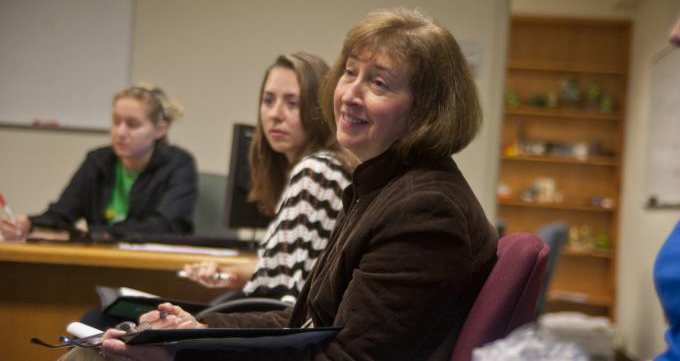Honors Program Enhances Learning for Top Students
With Honors
The Point
Winter 2012

Honors Program Director Helen Fallon with Students.
University course work is always a challenge for students at Point Park. But one group of students has taken their study to a higher level by participating in the Honors Program, which is designed to enhance their academic experience as they seek intellectual and personal growth.
Developed by P. K. Weston, Ph.D., English composition and literature professor, the Honors Program cultivates a motivated community of learners to not only experience more rigorous studies but also to move beyond the traditional classroom to participate in community service and leadership activities. This combination of coursework and community involvement provides a depth of study beyond the conventional expectations of collegiate education.
Currently there are 295 honors students enrolled throughout the University, according to Helen Fallon, director of the Honors Program. High school or transfer students who have earned a 3.5 QPA and scored more than 1700 on the SAT or 25 on the ACT test are automatically admitted into the program when they are accepted to Point Park. Other students may apply for admission either upon enrollment or after they begin their studies.
In-depth Study
Honors classes focus on in-depth study that includes a variety of course materials, discussions and assignments in small, intensive classes that allow one-on-one time with professors. The classroom experience is enhanced with lectures by guest speakers, field trips and creative and interactive assignments.
"The thing that appeals to me most about the Honors Program is the individual attention from the professors and the community service," says Carleigh Dettore, psychology and biology major and president of the Honors Student Organization. "I like that the program is extremely flexible; all of the professors and program directors are very accommodating and want to see you succeed."
In addition to honors level courses, traditional classes can also be "honorized" as students collaborate with faculty on aaditional projects and work to enhance the learning experience. Credits are given for core honors section classes, independent studies, upper level or contract courses. Students may also complete a thesis or honors final project. Students who complete 18 credits receive an honors certificate in addition to their diploma at graduation.
Outside of the classroom, students are expected to participate in activities offered through the Honors Student Organization, including community service projects, as well as leadership and mentoring opportunities.
Students learn to "pay it forward" through volunteer activities with events like the Pink Feet Race for the Susan G. Komen Foundation and the Great Race for Pittsburgh's Citiparks. On campus, the group has been instrumental in coordinating activities for Martin Luther King commemorations.
Students venture outside of Pittsburgh for an alternative spring break every year that helps others in need. Past trips have included volunteering at nonprofits in New York City and working with Habitat for Humanity in New Orleans.
Dettore has seen first hand how intense classroom instruction works hand-in-hand with the community service projects. Her plans are to attend medical school, where she believes the Honors Program experience will help her to become a "compassionate and caring physician."
The program also offers networking opportunities with real-life practitioners and potential employers. Students, who are members of the National Collegiate Honors Council, attend and present their work at regional and national honors conferences, where they benefit from meeting other honors students and their professors.
Setting the Stage for Success
Ultimately, the Honors Program sets the stage for students as they prepare for further study or careers after graduation. Graduate schools are drawn to honors-level students, according to Fallon.
The enhanced program of study has led to many graduates continuing on to graduate school, including Mark Frantz who has found he is much better prepared for the increased expectations at this level. A 2010 Biology graduate, Frantz is currently studying biology in the masters program at Indiana University of Pennsylvania.
"The Honors Program work is really helping me now as I am expected to conduct rigorous research," explains Frantz. "I developed great academic merit for life because of my full undergraduate experience."
Text by Camille Downing
Photo by Chris Rolinson
The Point is a magazine for alumni and friends of Point Park University.

